新目标英语九年级Unit2学案设计及练习
最新人教版新目标九年级英语Unit2单元教案教学设计(含全单元知识点)
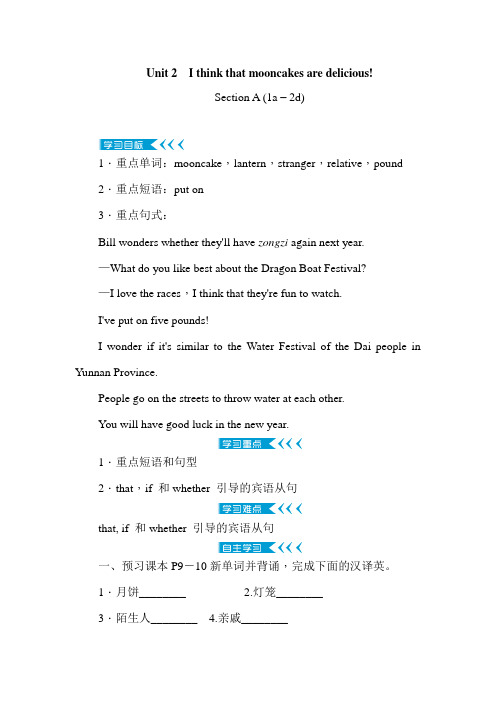
Unit 2I think that mooncakes are delicious!Section A (1a-2d)1.重点单词:mooncake,lantern,stranger,relative,pound2.重点短语:put on3.重点句式:Bill wonders whether they'll have zongzi again next year.—What do you like best about the Dragon Boat Festival?—I love the races,I think that they're fun to watch.I've put on five pounds!I wonder if it's similar to the Water Festival of the Dai people in Yunnan Province.People go on the streets to throw water at each other.You will have good luck in the new year.1.重点短语和句型2.that,if 和whether 引导的宾语从句that, if 和whether 引导的宾语从句一、预习课本P9-10新单词并背诵,完成下面的汉译英。
1.月饼________ 2.灯笼________3.陌生人________ 4.亲戚________5.磅________二、认真预习1a-2d内容找出下列短语和句型。
1.增加________________________________________________________ ________________2.Bill 想知道明年他们是否还能吃粽子。
_______________________________________________________ _________________3.—关于端午节你最喜欢什么?—我喜欢比赛,我认为他们看起来很有趣。
新目标九年级Unit2导学案

新目标九年级Unit2导学案1 / 16九年级英语第二单元导学案_UNIT2 I used to be afraid of the dark. (Section A 1a~2c )学习目 标 1.学会用句型used to 谈论过去曾经做过或喜欢的事2. 掌握描述人的性格的形容词,shy ,serious, outgoing 等3.重点短语:used to wait a minute play the piano be interested in on the swimteam学 习 导航一.预习感知(设置提纲 引导自学)1. 写出描述人的性格和外貌的词或短语 外貌的词 : Short hair _________________________________________________个性特征的词 : quiet______________________________________________________2. 谈论你熟悉的人的过去并完成填空My friend _______ used to be . He used to wear and have hair.二.(分组讨论 合作探究)I. People sure change.人确实在变be on a team 加入…队 II.I'm _____a swim team.我加入了游泳队III.句型used to 的用法1. 例句:Mario used to be short./ He used to wear glasses.“主语+used to+动词原形+其它”。
2. 在这个句型结构中used to 的含义为“过去常常”。
表示过去的习惯,暗示现在已无此习惯When I was a child, I ____________ chocolate.当我还是个孩子时,我常常喜欢吃巧克力。
3.used to+动词原形的否定形式:主语+didn ’t use+to do 或 主语+usedn ’t +to do例如 He _____use to study hard = He ________to study hard 4. used to do 的疑问式及其回答 (1) Used + 主语 + to do---?回答;Yes ,sb used to/sb usedn ’t to (2) Did + 主语 + use to do---?回答;Yes,sb did/No,sb didn ’t 如:she used to clean the room every day.(变一般疑问句)。
新目标九年级英语英语第二单元学案附最新中考试题练习

Unit2 I think that mooncakes are delicious !Period 1 (Section A 1a-2d)学习目标:1. 了解不同国家、不同地区的特色节日。
2. 初步掌握由that, if, whether引导的宾语从句。
二、学习过程:Lead-in Task : new words and sentence patternsTask 1: 熟悉句子形式,练习口语。
A: What do you like best about...B: I like..., (because)...1a-1c Pre-listening:Task 2: 看图片及1a中的词汇,将图片与句子搭配,完成1a。
Task 3: 读1a中句子,讨论句子所谈论的节日。
1a-1c While-listening:Task 4: Listen for the general idea听取大意。
The main idea of the conversations is to talk about______.A. The Lantern FestivalB. The Chinese Spring FestivalC. The Dragon Boat FestivalTask 5:Listen for the specific ideas听取细节, finish 1b.1a-1c Post-listening:Task 6: Finish 1c. Work in pairs2a-2c Pre-listening:Task 7: Guessing: According to the information in 2a and 2b.1. Whose vacation are they talking about,Wu Ming's or Harry's?2. Did Wu Ming visit anyone on his trip?3. What do you think he did during his trip?2a-2c While-listening:Task 8: Listen to the tape and finish 2aTask 9: Listen again and finish 2b2a-2c Post-reading:Task 10: Listen and repeatTask 11: Fill in the blanks in the rewriting passage.Wu Ming visited his aunt and uncle in________on his vacation.They ________a lot. They think the food is _______! And they also_________in Hong Kong. He likes the___________Festival best. His friend, Harry, wants to see__________ in Hong Kong next year.2dTask 12: Answer the questions.1. Have you ever been abroad?2. Do you know where Chiang Mai is?3. (Listen 2d for the main idea.) The main idea of 2d is ________A.the Water Festival in Yunnan ProvinceB.the Water Festival in Chiang MaiC.the Spring Festival in Chiang MaiTask 13 : Read for the specific ideas读取细节.1. When is the Water Festival in Chiang Mai?2. .What is the Water Festival in Chiang Mai similar to?3. What do people do during the Water Festival in Chiang Mai? Why do they do that?Task 14: Retell the conversationClara is going to _________in two weeks. There is a _______festival there from April ______to _____. This is the time of the the __________.The Water Festival is similar to the festival in______province. People can go on the streets to throw_____at each other. Because the new year is a time for_____ and _____away bad things.Then you’ll have ________in the new year.知识梳理Task 15: 根据句意及所给汉语提示填写单词。
九年级英语全册unit2《(1—2)》导学案人教新目标版
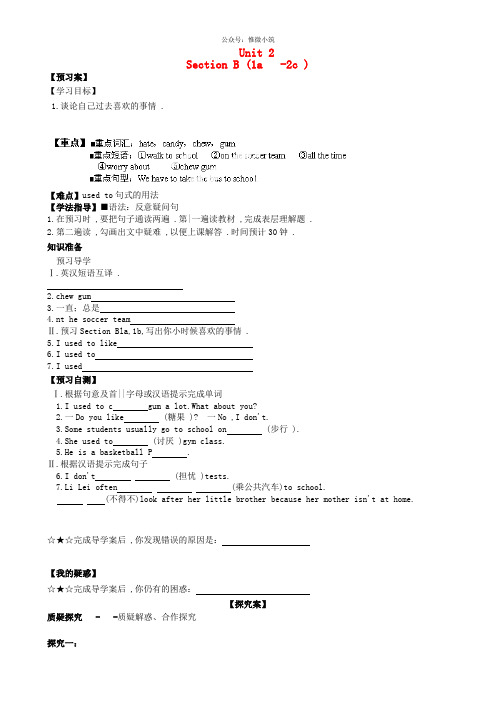
Unit 2Section B (1a -2c )【预习案】【学习目标】1.谈论自己过去喜欢的事情 .【难点】used to句式的用法【学法指导】■语法:反意疑问句1.在预习时 ,要把句子通读两遍 .第|一遍读教材 ,完成表层理解题 .2.第二遍读 ,勾画出文中疑难 ,以便上课解答 .时间预计30钟 .知识准备预习导学Ⅰ.英汉短语互译 .2.chew gum3.一直;总是4.nt he soccer teamⅡ.预习Section Bla,1b,写出你小时候喜欢的事情 .5.I used to like6.I used to7.I used【预习自测】Ⅰ.根据句意及首||字母或汉语提示完成单词1.I used to c gum a lot.What about you?2.一Do you like (糖果 )? 一No ,I don't.3.Some students usually go to school on (步行 ).4.She used to (讨厌 )gym class.5.He is a basketball P .Ⅱ.根据汉语提示完成句子6.I don't (担忧 )tests.7.Li Lei often (乘公共汽车)to school.(不得不)look after her little brother because her mother isn't at home. ☆★☆完成导学案后 ,你发现错误的原因是:【我的疑惑】☆★☆完成导学案后 ,你仍有的困惑:【探究案】质疑探究 - -质疑解惑、合作探究探究一:一、重点单词与短语1.hateu.讨厌;恨;不喜欢例如:I used to hate music class.我过去讨厌音乐课 .【拓展】hate后跟名词、代词、动名词或不定式作宾语,同义词为dislike ,反义词like .【跟踪训练】(1)他不喜欢在晚上开车He hates at night.2.chew.嚼;咀嚼【跟踪训练】(2)吃饭要细嚼慢咽 .You must your food well before you swallow it.3.worry about担忧;焦虑【拓展】与be worried about同义【跟踪训练】(3)不要担忧她 .Don't her.探究二:二、重点句型与语法■句型We have to take the bus to schoo1.我们不得不乘公共汽车去上学 .【精解】①have to意为 "必须;不得不〞 ,后跟动词原形 .【辨析】have to/musthave to具有客观性 ,不以人的主观意志为转移;而must强调主观性 .have to可以用于各种时态 ,而must那么不能 .【跟踪训练】(4)他不得不早起赶早班车 .He get up early to catch the early bus .(5)我们必须学好英语 .We learn English .【精解】②take the bus意为 "乘公共汽车〞, "take +the +交通工具〞 ,相当于 "by +交通工具〞 . 【跟踪训练】(6) go to school by bus every day. (同义句转换 )I to schoo1 every day.探究三:重点语法 (After reading ,discuss and answer them)学法指导:分组讨论解决知识点然后自愿展示 , 每个知识点3分■语法反意疑问句反意疑问句 ,表示说话人提出某种情况或建议 ,询问对方是否同意 .(1)反意疑问句的结构反意疑问句是由 "陈述句 +反意疑问局部〞构成 ,其反意疑问局部的结构是:be动词/助动词/情态动词 +主语 .否认形式要用缩略形式 .①主句为肯定陈述句 ,反意疑问局部为否认形式 ,即 "前肯后否〞式 .【跟踪训练】(7)You are a student, ?②主句为否认陈述句 ,反意疑问局部为肯定形式 ,即 "前否后肯〞式 .【跟踪训练】(8)He hasn't finished his homework , ?(2)反意疑问局部的主语和谓语确实定①反意疑问局部的主语用代词而不用名词 .【跟踪训练】(9)My brother likes playing basketball, ?②陈述句中含有否认意义的词 ,如little ,few,never,hardly ,nothing ,nobody等 ,其反意疑问局部用肯定形式 .【跟踪训练】(10)He knows little English , ?③陈述句是 "there be〞结构时 ,其反意疑问局部用 "be +there" .【跟踪训练】(11)There is a post office near the school, ?④以Let's开头的祈使句 ,反意疑问局部为shall we;以Let us开头的祈使句 ,反意疑问局部为willyou;主句为祈使句 ,反意疑问局部为will you .【跟踪训练】(12)Let's go home , ?(13)Don't be late again , ?⑤陈述句中含有情态动词must时 ,假设must表示 "必须〞时 ,反意疑问局部用needn't .假设must表示推测 "一定;想必〞之意时 ,其反意疑问局部的动词应根据must后面的动词来确定 .【跟踪训练】(14)We must work hard , ?(15)She must have finished her homework, ?⑥当陈述句为含有宾语从句的主从复合句时 ,反意疑问局部的动词和主语通常与主句的动词和主语保持一致.假设主句的主语是第|一人称I/we ,其谓语动词又是think ,sup -pose ,believe ,imagine等 ,那么反意疑问局部的主语和动词应与从句的主语和动词保持一致 .归纳总结:【训练案】课后练习Ⅰ.单项选择( )1.Tom plays basketball well and he is the basketball team.( )2.If you are famous,people will follow you .A.all the timeB.the all timeC.a11 timeD.time all( )3.He used to play ping -pang , .A.don't heB.didn't heC.wasn't heD.doesn't he( )4. -You are new here , . -Yes,I came here last year.A.do youB.don't youC.are youD.aren't you( )5. -Bill had nothing for breakfast this morning ?- ,he got up too late.A.had he;YesB.hadn't he;YesC.did he;NoD.didn't he;NoⅡ.阅读理解It took John many months to save up (积蓄 )seven pounds.He wanted to buy a new model plane and went to the shop with the money.On the way,John saw a little boy crying on the corner of the street. "Why are you crying?〞John asked."Three big boys took away four pounds from me just now ,〞the boy said. "I was on my way to buy some exercise books ,but I can't.〞John thought of the seven pounds in his pocket.He thought of the model plane and the poor boy.John wanted to walk away ,but he did not.At last he gave four pounds to the boyandwent home.John felt happy.Do you know why?It was because the little boy was happy.根据短文内容填空John spent many 6 saving 7 8 to buy a new model plane.On the way to the 9 ,he sawa boy 10 .The boy 11 John that three boys had taken away four pounds from him ,and he couldn't12 some exercise books.13 last John gave 14 four pounds.John didn't buy the 15 plane ,but he felt happy all the same.6. 7. 8. 9. 10.11. 12. 13. 14. 15.。
新目标英语九年级Unit 2全模块教案

新目标英语九年级 Unit 2 全模块教案一、教学目标•了解并掌握本单元的词汇、短语和语法知识。
•能够熟练运用所学知识进行听、说、读、写的综合训练。
•能够理解相关的听力材料,并提高自己的听力技巧。
•培养学生的英语口语表达能力,增强他们的交际能力。
•提高学生的阅读理解能力,并培养他们的阅读习惯。
•培养学生的写作能力,能够用英语进行简单的写作。
二、教学内容1. 词汇与短语•Unit 2 单词:average, customer, delicious, dessert, diary, instead, junk, paste, screen, secret, slice, specialty•Unit 2 短语:a cup of, be made from, be sick, a piece of, at the age of, be tired of, buy…for…, look forward to, talk to, take…seriously2. 语音知识•单词重音:在单词中找出发音音节,判断音节重音所在。
3. 语法知识3.1 名词性从句•引导名词性从句的连接词:that, whether, what, who, whom, whose, which, why, when, where, how等。
•名词性从句作主语、宾语、表语和同位语的句子结构。
•运用名词性从句的句型进行语言表达。
3.2 定义从句•引导限制性定语从句的连接词:that, which, who, whom, whose•并列使用连接词that的定义从句。
•运用定义从句进行描述和补充说明。
3.3 定语从句•引导非限制性定语从句的连接词:that, which, who, whom, whose•根据先行词在定语从句中的不同成分,选择适当的关系代词和关系副词,并完成句子结构。
•运用定语从句对先行词进行修饰。
3.4 名词性从句与定语从句的比较•名词性从句与定语从句的区别和联系。
人教新目标九年级英语 unit 2单元整体教学设计模板
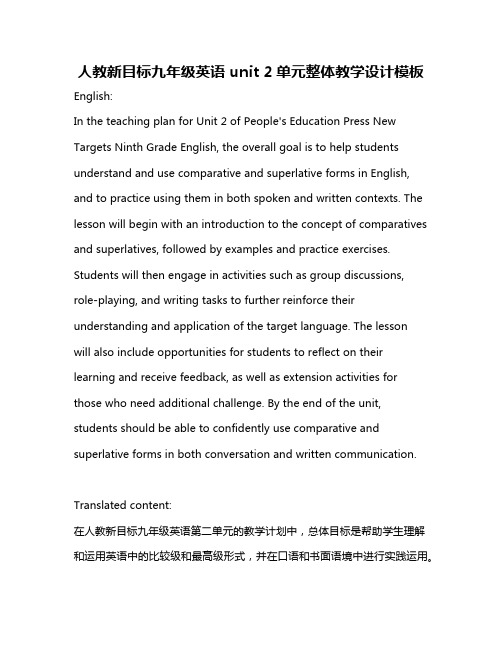
人教新目标九年级英语 unit 2单元整体教学设计模板English:In the teaching plan for Unit 2 of People's Education Press New Targets Ninth Grade English, the overall goal is to help students understand and use comparative and superlative forms in English, and to practice using them in both spoken and written contexts. The lesson will begin with an introduction to the concept of comparatives and superlatives, followed by examples and practice exercises. Students will then engage in activities such as group discussions,role-playing, and writing tasks to further reinforce their understanding and application of the target language. The lessonwill also include opportunities for students to reflect on their learning and receive feedback, as well as extension activities for those who need additional challenge. By the end of the unit, students should be able to confidently use comparative and superlative forms in both conversation and written communication.Translated content:在人教新目标九年级英语第二单元的教学计划中,总体目标是帮助学生理解和运用英语中的比较级和最高级形式,并在口语和书面语境中进行实践运用。
人教新目标九年级英语全册Unit 2导学案 人教新目标版
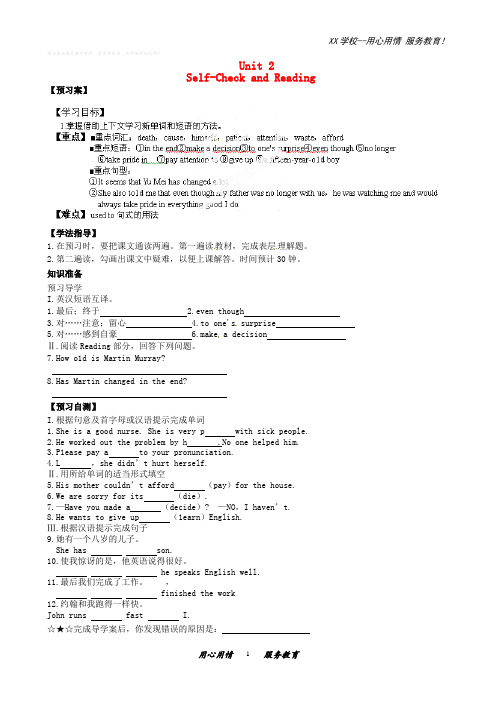
精品基础教育教学资料,请参考使用,祝你取得好成绩!Unit 2Self-Check and Reading【预习案】【学法指导】1.在预习时,要把课文通读两遍。
第一遍读教材,完成表层理解题。
2.第二遍读,勾画出课文中疑难,以便上课解答。
时间预计30钟。
知识准备预习导学I.英汉短语互译。
1.最后;终于2.even though3.对……注意;留心4.to one's surprise5.对……感到自豪6.make a decision Ⅱ.阅读Reading部分,回答下列问题。
7.How o1d is Martin Murray?8.Has Martin changed in the end?【预习自测】I.根据句意及首字母或汉语提示完成单词1.She is a good nurse. She is very p with sick people.2.He worked out the problem by h .No one helped him.3.P1ease pay a to your pronunciation.4.L ,she didn’t hurt herself.Ⅱ.用所给单词的适当形式填空5.H is mother couldn’t afford(pay)for the house.6.We are sorry for its (die).7.—Have you made a (decide)? —NO,I haven’t.8.He wants to give up (1earn)English.Ⅲ.根据汉语提示完成句子9.她有一个八岁的儿子。
She has son.10.使我惊讶的是,他英语说得很好。
he speaks English well.11.最后我们完成了工作。
,finished the work12.约翰和我跑得一样快。
John runs fast I.☆★☆完成导学案后,你发现错误的原因是:【我的疑惑】☆★☆完成导学案后,你仍有的困惑:【探究案】质疑探究——质疑解惑、合作探究探究一:一、重点单词与短语1.death n.死;死亡例如:His pet dog’s death made him very sad.宠物狗的死使他很伤心。
新目标英语九年级第二单元学案 第二课时学案
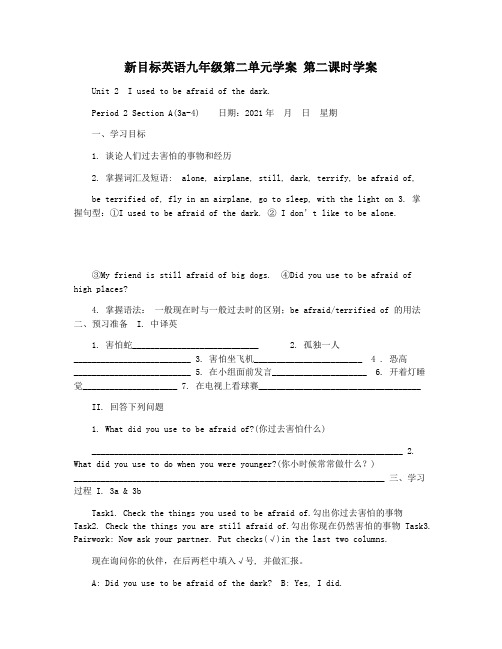
新目标英语九年级第二单元学案第二课时学案Unit 2 I used to be afraid of the dark.Period 2 Section A(3a-4) 日期:2021年月日星期一、学习目标1. 谈论人们过去害怕的事物和经历2. 掌握词汇及短语: alone, airplane, still, dark, terrify, be afraid of,be terrified of, fly in an airplane, go to sleep, with the light on 3. 掌握句型:①I used to be afraid of the dark. ② I don’t like to be alone.③My friend is still afraid of big dogs. ④Did you use to be afraid ofhigh places?4. 掌握语法:一般现在时与一般过去时的区别;be afraid/terrified of 的用法二、预习准备 I. 中译英1. 害怕蛇____________________________2. 孤独一人__________________________ 3. 害怕坐飞机________________________ 4 . 恐高__________________________ 5. 在小组面前发言_____________________ 6. 开着灯睡觉_____________________ 7. 在电视上看球赛____________________________________II. 回答下列问题1. What did you use to be afraid of?(你过去害怕什么)_____________________________________________________________________ 2. What did you use to do when you were younger?(你小时候常常做什么?)_____________________________________________________________________ 三、学习过程 I. 3a & 3bTask1. Check the things you used to be afraid of.勾出你过去害怕的事物Task2. Check the things you are still afraid of.勾出你现在仍然害怕的事物 Task3. Pairwork: Now ask your partner. Put che cks(√)in the last two columns.现在询问你的伙伴,在后两栏中填入√号, 并做汇报。
- 1、下载文档前请自行甄别文档内容的完整性,平台不提供额外的编辑、内容补充、找答案等附加服务。
- 2、"仅部分预览"的文档,不可在线预览部分如存在完整性等问题,可反馈申请退款(可完整预览的文档不适用该条件!)。
- 3、如文档侵犯您的权益,请联系客服反馈,我们会尽快为您处理(人工客服工作时间:9:00-18:30)。
九年级Unit2学案设计第1课时 Unit 2 Section A 1a—2c一、激情投入读听力材料并归纳掌握如下短语和句子弹钢琴 __________________ 踢足球 ___________________对…更有兴趣_____________________ 在游泳队_________________你不记得我了吗?____________________________ ?二、(学案引导)自主学习He used to go to school by bike.否定句_________________一般疑问句及肯定和否定回答①_____________________________②________________________________反意疑问句______________________________________就划线部分提问___________________________________三、合作探究1.Mario, you use to be short,didn’t you?[点拨]used to 意为___________________________, 后跟________________,暗指现在此状态不存在了或动作不发生了。
辨析Used to do过去常常做某事/ be(get)used to doing习惯于做某事/ be used to do被用于做某事①The old man ___________________be a soldier.(这位老人过去是一个士兵)②He ____________________English at night. (他习惯于在晚上读英语)③Paper ____________________write letters.(纸被用来写信)2.People sure change .[点拨]句中sure作副词,意为____________,用来修饰动词change.在美式英语中,sure 常表示―当然可以‖,相当__________ ①—Can you come to my birthday party?—__________.A.Yes ,I’d loveB. Sure, I’d love toC. No , I’d love toD. Of course not四、展示点评学习Grammar Focus中的句子,理解归纳used to的用法1、used to意为:2、used to后面加3、used to的否定式有两种形式4、used to的反意疑问句5、 used to的一般疑问式为五.总结梳理总结: "used to" 句型的陈述句、一般疑问句、否定句,举例说明________________________________________________________________________________________________________________________________________________六.达标检测(一)根据句意和首字母完成句子1、Amy used to ___________ (play) soccer.2、His sister used to be quiet, now she is outgoing.3、our headteacher is very s__________. We often get nervous when we see him.4、He's i____________ in playing the piano.(二)完成对话A: Hey, Amy,it's _____ to see you.B: Hi,Li Lei. How are you?A: _________. Wow, you have changed.B: Really? How?A: Well, you _________ _____ have long hair.B: You remember that? Yes, I did.A: And you ________ _____ ______ really tall!B: Not at all. You're ________ than me now. And I remember you __________ ________ basketball. What about playing basketball now?A: OK. Let's ______.(三)句型转换.1、My mother used to take a walk after dinner.( 对划线部分提问)_____ ______ your mother _____ ______ _______ after dinner?2、She used to live in Beijing Hutong, ______ _________? (完成反意疑问句)第2课时Unit 2 Section A3a---4一、激情投入Task 1 : 谈论自己过去和现在的变化利用used to句型谈论Mary过去和现在的变化past nowshort talllong black hair short hairquiet more outgoingplay the piano play the sportsTask 2: 利用 used to 句型谈论自己及他人过去害怕什么1、仿照对话两人一组,互相询问对方过去害怕什么— What did you use to be afraid of ?—I used to be afraid of--- ( dark; being alone; snakes; flying in an airplane;big dogs;high places;speaking in front of a group)—Are you still afraid now?— Yes, I am / No, I 'm not.2、两人一组,用第三人称进行替换练习3、仿照3b 对话,对比自己和过去变化二、(学案引导)自主学习非常害怕______________ 高的地方_________________ 入睡______________ 看电视_________________ 独处___________________ 你呢__________________乘飞机________________ 在众人____________________三、合作探究1. be afraid of 害怕--- 后面跟n/ Ving不要害怕那只狗______________________________________他害怕一个人呆着____________________________________2. be afraid to do sth 害怕做某事他害怕同老师谈话 He is ______ ________talk to teachers3. be terrified of 恐惧---- 与be afraid of 用法相同我对蛇怕的要命 ____________________________________4. on 是副词―开通;开着‖指电器在开着的状态中灯都开着 The lights are all ________.5. go to sleep 入睡 = _______________昨晚你几点睡着的?___________________________________________?四、展示点评总结be afraid of 的用法总结used to be afraid of 的用法五.总结梳理总结: "used to be afraid of" 句型的陈述句、一般疑问句、否定句,举例说明________________________________________________________________________________________________________________________________________________六.达标检测(一)用所给词的适当形式填空1. I used to ________(have) long black hair2. I 'm afraid of _________(go) out at night3. He is afraid _________(go) there.4. I'm ________(terrify) of spiders.5. He ____________(not use) to be afraid of the dark6. I am ____________(interest) to hear your story.(二)翻译句子1. 她过去常常穿红衣服_____________________________________________________________________ 2. 你过去常常害怕一个人呆着吗?不,不是。
______________________________________________________________________ 3. 我的朋友Tom过去常常害怕在众人面前讲话。
______________________________________________________________________ 4. 我睡觉时开着卧室的灯___________________________________________________________________第3课时 Unit 2 Section B 1a-2c一、激情投入Task 1: (1a) Check the things you liked when you were a child. Look at the pictures and check the ones you like.1. Write some things that you used to like to do when you were a child.eg : Iused to eat candy.2. Discuss them with a partner.Task2 : (1b,2a) Practise "used to " "I didn't used to …"2a 1. Read and understand the four sentences.2. Listen and check the sentences you hear.3. Check the answers.2b 1. Listen again and fill the from.2. Check the answers.Task 3 (2c) Practice "Did you use to …?"Practice like this:A: I used to eat candy all the time ? Did you ?B: Yes, I did . And I used to chew gum a lot.二、(学案引导)自主学习翻译下列短语:体育_______________画画_______________音乐课_______________ 蜘蛛和其它的昆虫_______________六岁的弟弟_____________为…担心_____________一直_______________ 嚼口香糖___________________步行去上学_____________坐汽车______________体育课_______________我过去常常不喜欢考试。
